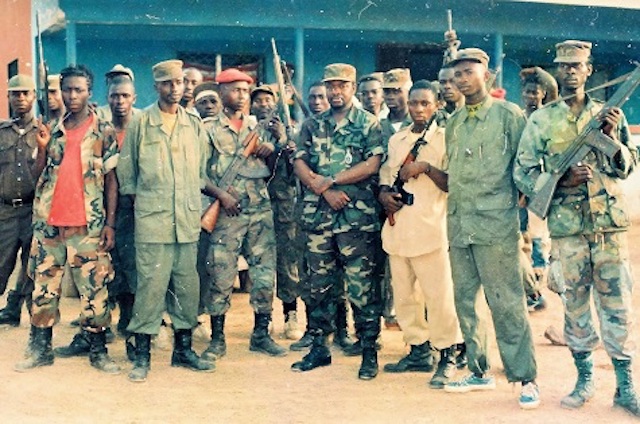A Paris court has made history in convicting a former Liberian rebel commander for complicity in crimes against humanity under the principle of “universal jurisdiction”.
Kunti Kamara was also found guilty acts of barbarity, including torture, cannibalism, and forced labour during the country’s first civil war more than 25 years ago. He was given a life sentence.
The three-week trial was the first in France of a non-Rwandan suspect accused of wartime atrocities since the special crimes against humanity tribunal was set up in Paris in 2012.
Young rebels pose and display their weapons as they chat in Monrovia in 1992 during the Liberian civil war
After the verdict, which came late on Wednesday after the judges deliberated for 10 hours, Alain Werner, a human rights lawyer and the director of Civitas Maxima, said the trial showed there was a legal recourse for victims of atrocities – even those committed in long forgotten conflicts.
“It is an unbelievable milestone and a huge achievement for the victims and witnesses, one of whom was so traumatised even today that she collapsed giving evidence,” Werner told the reporters.
“Liberia is one of the poorest countries in the world and still the people concerned were able to get organised and get justice. They were forgotten by their own government, they were forgotten by the international community and it took them 10 years, but they were still able to get justice.
“This is a message of hope for all the forgotten victims of conflicts and a particularly important message right now in these dark time with the war on Ukraine. This is a trial to bring hope for every single victim of war crimes.”
Kamara, 47, admitted being a local commander in the United Liberation Movement of Liberia for Democracy (Ulimo), one of three rebel militias ranged against Charles Taylor’s National Patriotic Front of Liberia (NPFL) during the first Liberian civil war between 1989 and 1996 in which an estimated 200,000 people died. Taylor became president in 1997 and remained in office until 2003. He was given a 50-year sentence for war crimes in 2012.
Kamara, a naturalised Dutch citizen, was arrested in France in 2018 after another Liberian rebel commander called him as a defence witness in his own trial in Switzerland.
He was accused of war crimes that took place in the village of Foya in Lofa county, a strategic region in north-western Liberia, where Ulimo troops led by Kamara were said to have carried out “particularly atrocious acts of torture”.
During the trial, one witness, a teacher named only as Jasper C, told how Kamara’s forces killed a local man who was labelled a traitor after he was seen in a vehicle with a humanitarian organisation. After tying his arms behind his back and dragging him across the village, one of the rebels cut open the man’s chest with an axe and removed his heart, which was then cut up and eaten.
Kamara rejected all the accusations against him.
“Nothing bothers me more than to be accused of cannibalism,” Kamara said. “Each time I hear this I want to vomit. Why would I have done that?” He said the trial was a “conspiracy” against him.
The state prosecutor, Aurélie Belliot, said Kamara’s crimes were “the most serious there could be”.
“They destroyed lives and their seriousness was an attack on the whole of humanity,” Belliot told the court.
While there was no physical evidence against Kamara, his conviction rested on the testimony of witnesses whose evidence, albeit contradictory, was powerful.
Lawyer Sabrina Delattre for Civitas Maxima, which documents international crimes and was a civil party in the trial, said: “This trial is happening thanks to the evidence of the victims. That is at the heart of the trial. Nobody has exaggerated the facts,” she said.
Of Kamara, she added: “I don’t know more about him at the end of this trial because he has denied everything that happened at Foya ad nauseam.”
Marilyne Secci, representing Kamara, said: “This trial has looked kindly on the victims but not on my client. You want him to admit, but not explain.”
She said there was no evidence against Kamara. “There’s been no death certificate nor body. Why has nobody thought to dig to find the body (of the murdered Foya man)? I can well believe the Liberian justice system is poor, but surely it has a spade.”
She added the prosecution had “put the witnesses on a pedestal because they are all it has. Witnesses contradicted each other and they want us to believe that it makes their statements believable,” she said.
The case was brought in France under the principle of universal jurisdiction, which allows certain countries to claim criminal jurisdiction over an accused in the case of globally recognised crimes, regardless of where they were committed, the accused’s nationality or country of residence.
Article 689 of the French penal procedural code states that alleged crimes – namely torture, terrorism, nuclear smuggling, naval piracy and aircraft hijacking – can be judged in France even if they were committed outside French territory by foreigners.






